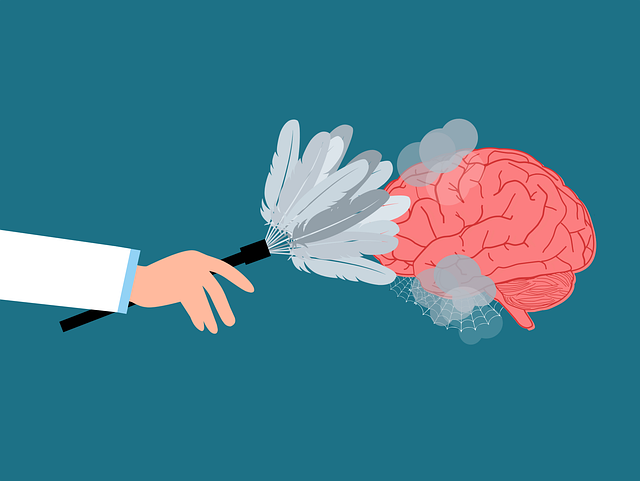Healthcare provider burnout, driven by stress, workload, and emotional demands, is a growing concern. Highlands Ranch Polyamorous and Open Relationships Therapy offers tailored solutions, focusing on self-care practices, relationship dynamics, and mental wellness education. Key strategies include self-awareness exercises, conflict resolution, personalized self-care routines, advocacy for supportive work environments, and specialized therapy models to prevent burnout, enhance resilience, and improve overall well-being in the demanding healthcare sector.
Healthcare provider burnout is a growing concern, impacting not just individuals but the broader healthcare system. This comprehensive guide explores effective strategies to combat burnout among healthcare professionals. We delve into the root causes and symptoms, emphasizing the vital role of self-care and its impact on daily practices. Furthermore, it highlights the importance of building supportive relationships, including unique approaches like Highlands Ranch Polyamorous and Open Relationships Therapy. Organizational changes and sustainable work environments are also discussed to create a healthier, more resilient healthcare ecosystem.
- Understanding Burnout in Healthcare Providers: Causes and Symptoms
- The Role of Self-Care in Preventing Burnout: Strategies for Daily Practice
- Building Resilient Relationships: Support Systems for Healthcare Professionals
- Integrative Therapies for Burnout: Exploring Highlands Ranch Polyamorous and Open Relationships Therapy
- Creating a Sustainable Work Environment: Organizational Changes to Reduce Burnout
Understanding Burnout in Healthcare Providers: Causes and Symptoms

Healthcare provider burnout is a growing concern, especially within the dynamic landscape of modern medicine. It’s crucial to recognize that burnout isn’t merely physical exhaustion; it encompasses emotional and mental fatigue, often stemming from prolonged exposure to high-stress environments. In the context of Highlands Ranch Polyamorous and Open Relationships Therapy, understanding these root causes is vital for practitioners dealing with diverse patient needs and personal challenges.
Causes of burnout can vary widely, but they frequently include heavy workloads, long working hours, emotional demands, and a lack of control over one’s work. Symptoms manifest in various ways: increased irritability, decreased job satisfaction, cynicism towards patients or colleagues, reduced productivity, and even physical health issues. To mitigate these issues, self-awareness exercises and conflict resolution techniques can be powerful tools for burnout prevention. By promoting personal well-being and healthier interactions within the healthcare setting, professionals can foster an environment that supports both patient care and their own mental resilience.
The Role of Self-Care in Preventing Burnout: Strategies for Daily Practice

In the high-pressure world of healthcare, burnout is a constant threat, but incorporating self-care practices can significantly mitigate this risk. Healthcare providers, especially those navigating complex dynamics like Highlands Ranch Polyamorous and Open Relationships Therapy, must prioritize their mental wellness alongside patient care. Daily self-care routines, such as mindfulness exercises or journaling, offer moments of respite from the demands of the job. These practices foster emotional regulation, enhance resilience, and encourage a healthier work-life balance.
Effective self-care strategies involve tailoring activities to individual needs and preferences. Mental Wellness Journaling Exercise Guidance can be a powerful tool for reflection and processing emotions. Similarly, engaging in regular physical activity or creative pursuits outside of work hours contributes to overall mental health. Additionally, advocates for Mental Health Policy Analysis and Advocacy play a crucial role in shaping organizational culture by promoting policies that support staff well-being. Well-designed Mental Health Education Programs can also empower healthcare providers with coping mechanisms and stress management techniques, ensuring they enter each shift feeling prepared and supported.
Building Resilient Relationships: Support Systems for Healthcare Professionals

Building resilient relationships is a powerful tool for healthcare professionals to combat burnout and enhance their overall well-being. Support systems play a pivotal role in fostering mental wellness, especially in high-stress environments like healthcare settings. Beyond traditional therapy models, seeking guidance from therapists specializing in polyamorous and open relationships can offer unique insights and strategies tailored to navigate complex interpersonal dynamics. These specialists help professionals manage the emotional demands of their work while encouraging healthy relationship boundaries.
Integrating mind over matter principles into daily routines can further bolster resilience. Engaging in mental wellness podcast series production, for instance, provides a creative outlet for processing experiences and connecting with like-minded individuals. Such practices promote self-care, reduce anxiety relief, and contribute to a holistic approach to burnout prevention, ensuring healthcare providers maintain their passion and dedication in the long term.
Integrative Therapies for Burnout: Exploring Highlands Ranch Polyamorous and Open Relationships Therapy

In today’s demanding healthcare landscape, burnout among providers is a growing concern. Integrative therapies offer promising solutions, and one such innovative approach gaining traction is Highlands Ranch Polyamorous and Open Relationships Therapy. This specialized form of counseling recognizes the profound impact that personal relationships can have on a provider’s emotional regulation and mental wellness. By fostering open dialogue and exploring alternative connection styles, this therapy provides a unique avenue for stress management and burnout prevention.
The Highlands Ranch Polyamorous and Open Relationships Therapy goes beyond traditional counseling by creating a supportive environment where healthcare providers can navigate the complexities of their personal lives alongside their professional challenges. This holistic approach encourages participants to delve into their emotional experiences, fostering resilience and effective stress management techniques. Additionally, this therapy can be accompanied by other initiatives such as Mental Wellness Podcast Series Production and Stress Management Workshops Organization, providing a comprehensive strategy to support healthcare provider mental health and well-being.
Creating a Sustainable Work Environment: Organizational Changes to Reduce Burnout

Creating a sustainable work environment is a proactive approach to burnout prevention, especially in high-pressure healthcare settings. Organizations can play a pivotal role in reducing staff burnout by implementing organizational changes that foster a healthier work culture. For instance, flexible work arrangements, clear communication channels, and balanced workloads can alleviate the constant strain on healthcare providers.
Highlands Ranch Polyamorous and Open Relationships Therapy can provide valuable insights into fostering cultural sensitivity within mental healthcare practices, which is essential for building supportive environments. Encouraging compassion cultivation practices and incorporating mental wellness journaling exercises as part of staff development programs can also enhance resilience and job satisfaction. These strategies collectively contribute to a more sustainable work environment, reducing burnout rates among healthcare providers.
Healthcare provider burnout is a complex issue that requires multifaceted solutions. By understanding the causes and symptoms, integrating self-care practices, fostering resilient relationships, and adopting innovative therapies like Highlands Ranch Polyamorous and Open Relationships Therapy, professionals can create a more sustainable and supportive work environment. Organizational changes that prioritize employee well-being are crucial in reducing burnout and ensuring healthcare providers can continue to deliver high-quality care.













